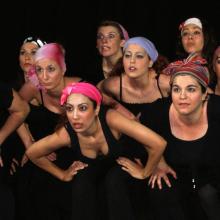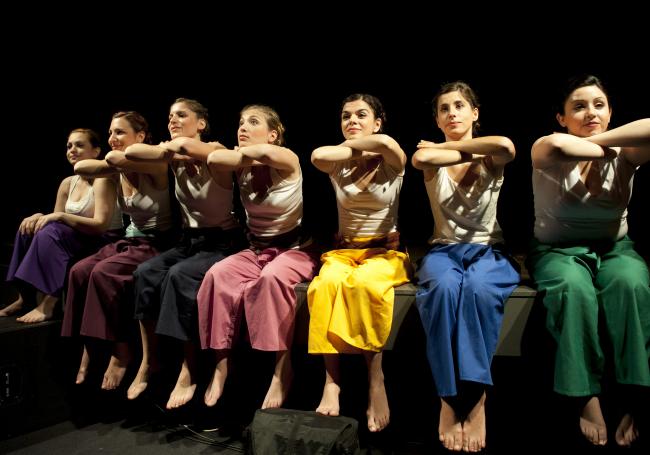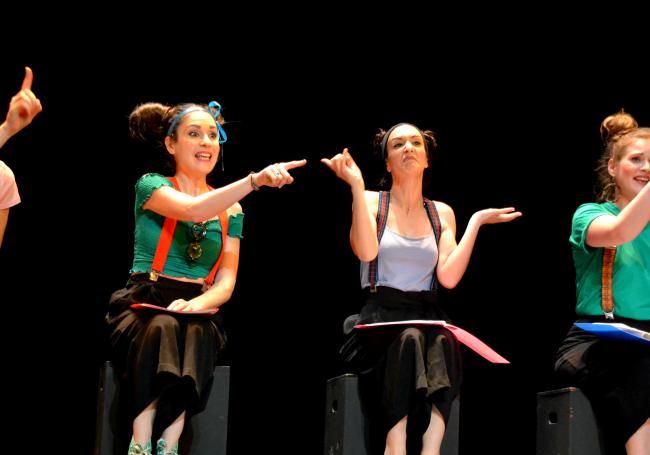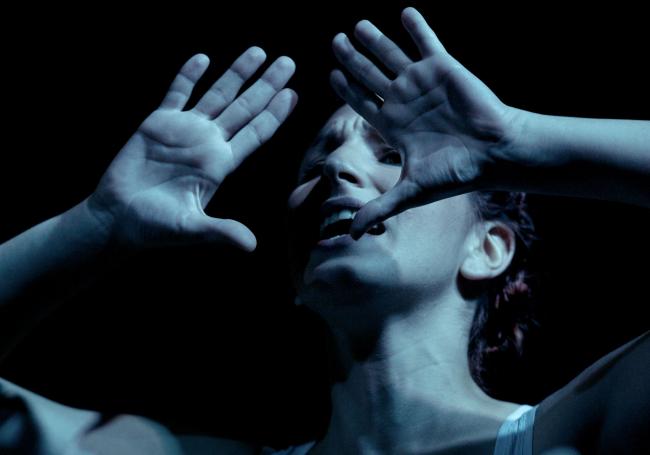Program of Specialization in Teaching trough the arts – Classroom drama
Contents - Goals: The main educational curriculum of the ANIMA workshop has been running and improving since 1986, with the aim of educating on topics such as Theater games - classroom drama, Music kinetic edukation systems, Theatrical movement - Kinetic improvisations, Theatrical Expression Techniques e.t.p. This curriculum is named “Full Course of Seminars - classes” and is comprised of a selection of courses that specialize in "Teaching trough the arts".
The goals of this curriculum are:
To provide participants with knowledge, experiences and methodology for utilizing the arts in their profession,
To provide training in theatrical play - artistic animation, with special focus on three factors: Theater- music - movement,
To broaden participants’ horizons and strengths in their participation in creative and expressive pursuits.
(Read more on the goals and philosophy of Anima here.)
Levels: The Full Course of Seminars is divided into two separate levels of courses. Each level has the duration of one academic year. Attending the second level requires having attended the first.
Options: Participants can attend the first or both level of courses.
Attendance: The Anima courses and seminars are experience-based, and attendance is mandatory.
Who this is for: generalist educators, arts educators, special educators, performance studies majors/ theatrologists, animators, actors, musicians, gym teachers, museum educators, social workers, psychologists, therapists, students in educator and artistic university departments, and all those working or about to work with theatrical play -theatrical animation.
Duration of Each Level: Two academic semesters (168 hours of instruction)
Teaching Staff: The teaching staff of ANIMA are essential members of the ANIMA team, with unique and valued work and experience in the artistic, pedagogical, and academic worlds.
Certifications: After completing the full course of study (both levels), the participants have acquired training in “Artistic and Creative Education”, and receive a certificate of study. After completing each level, the participants receive a certificate for the relevant level of courses they have attended.
Opening Dates for academic year 2021-2022: 1st Cycle October 15th, 2nd Cycle October 18th.
Cost: Registration 120 € + 8 monthly installments of 95€.
Registration: For information on registration, anyone interested can get in touch with ANIMA’s office by phone, or by filling out the communication form.
Read here for some comments by our graduates.
BASIC SCHEDULE
1st LEVEL
SEMINARS - COURSES: Winter semester
Duration: October 15, 2021 - January 28, 2022
|
Theatrical Expression Techniques A' |
Tuesday, 18.30 - 19.30 |
|
Theatrical Movement - Kinetic Improvisations A' |
Tuesday, 19.45 - 21.00 |
|
Theater Games - Drama in Education. Applications A' |
Friday, 18.30 - 21.00 |
|
Musical kinetic systems A‘ |
Friday, 18.30 - 21.00 |
Note: On Fridays, the courses “Theatrical play. Applications” and “Musical kinetic systems” alternate weeks.
SEMINARS - COURSES: Spring semester
Duration: February 1, 2022 - May 31, 2022
| Theatrical Expression Techniques B' | Tuesday, 18.30 - 19.30 |
|
Theatrical Movement - Kinetic Improvisations B' |
Tuesday, 19.45 - 21.00 |
|
Theater Games - Drama in Education. Applications B' |
Friday, 18.30 - 21.00 |
|
Musical kinetic systems B' |
Friday, 18.30 - 21.00 |
Note: On Fridays, the courses “Theatrical play. Applications” and “Musical kinetic systems” alternate weeks.
2nd LEVEL
SEMINARS - COURSES: Winter semester
Duration: October 18, 2021 - January 31, 2022
|
Creativity and Imagination |
Monday, 18.30 - 21.00 |
|
|
|
|
Theater Games. Pedagogical Method Thursday |
Thursday, 18.30 - 21.00 |
|
Music - Musical Kinetics. Pedagogical Programs |
Thursday, 18.00 - 21.00 |
SEMINARS - COURSES: Spring semester
Duration: February 3, 2022 - May 30, 2022
|
Story Narration |
Monday, 18.30 - 21.00 |
|
Drama Therapy Elements |
Monday, 18.30 - 21.00 |
|
Theater Games - Organization of Performances |
Thursday, 18.30 - 21.00 |
|
Expressive Movement |
Thursday, 18.30 - 21.00 |
SUMMARY AND COURSE CONTENT DESCRIPTIONS
Theatrical Games. Applications (1st Level)
In the course, a set of exercises, such as theatrical play, pantomime, improvisation and dramatization are implemented, on the basis of which the participants develop their imagination and cultivate their physical and verbal expression. Then, the objectives of the activities are analyzed and the factors determining them are studied. Thus, models for the implementation and organization of theatrical play programs arise.
Musical kinetic systems (1st Level)
Auditory - musical - kinetic activation is the central axis of this lesson. With specially targeted activities, participants evolve their musical sensors, experiencing the musical laws through their bodies. They learn to focus on sounds, dynamics, rhythms and melodies, and to use these elements as expressive and communicative means. In the course, theoretical, experiential and analytical teaching methods are adopted in turn.
Theatrical Movement - Kinetic Improvisations (1st Level)
Course content includes exercises borrowed from actors' preparation program, but adapted and tailored to educational goals. Participants will work on the use of the body as an expressive tool, will realize and broaden their limits, experiment with the kinetic - symbolic expression of emotions, create physical images and stories. The members of the group will focus on concepts such as: communication, collaboration, concentration, management of body energy, expressive use of body members, etc.
Theatrical Expression Techniques (1st Level)
Exercises and activities of fantasy, creativity, stage speech, bodily and vocal energy, communication, collaboration, public appearance, etc. are included in the subject matter of the lesson, so that each educator - animator can practice their expressive means and acquire useful tools for the didactic process.
Story Narration (2nd Level)
The lesson approaches the spatial, the kinesthetic and the theatrical dimension of telling a story or fairy tale. For this reason, all modes of expression (theatrical, bodily, acoustic, visual) are activated. Participants learn to faithfully approach the text, but also skillfully interfere with the plot, thereby creating their own myth
Music - Musical Kinetics. Pedagogical Programs (2nd Level)
Within the course, music-musical activities are understood as means of space and time perception, of development of logical-mathematical thinking, concentration, self-discipline, cooperation, expression, and spontaneous involvement. The participants in the course experiment with the design and implementation of musical and musical-kinetic exercises. In the process, focus group discussions are conducted, through which the methodology of applying Music Kinetics as a teaching subject (teaching music) and as a teaching means (teaching through music) is built.
Drama in Education (2nd Level)
On the 3rd level of the course, the analysis of theatrical methodology is sought. On the basis of the 1st and 2nd level applications, theatrical play emerges as a means of perceiving school knowledge, the self, and the world. Participants learn to classify the exercises and manage ways of organizing theater programs.
Expressive Movement (2nd Level)
The purpose of the lesson is to release the body so that it takes the form of our unlikely and indescribable imagination. The team, its dynamics, needs and capabilities are explored. Breathing exercises, endurance exercises, exercises of mimetic reproduction of everyday life events related to body movement are applied: “I walk, run, sit, lie down, jump. I pull, get pulled, push, grab. I recognize the great motor of life, the rhythm, I adopt it in my hands, my feet, my sound, and finally I integrate it and improvise it.” In this course, we become acquainted with patterns and exercises of the Jacques Lecoq method and also with sports and martial arts.
Teaching through Art (2nd Level)
The subject of the course is the aesthetic approach of arts integration. Participants learn to approach linguistic, mathematical, environmental, and other topics that ar contained in educational curricula as aesthetic stimuli. They cultivate their didactic readiness, treat art as an organic part of life, and streamline the other lessons they have received in ANIMA training.
Theater Games. Organization of Performance (2nd Level)
In the Fourth level, Theater Play activities combine to take the useful role of a cross-curricular approach to various topics contained in the current curriculum. Also, on the basis of this association between the theatrical subject matter and the subject matter of the school, the participants learn the steps needed to organize a theatrical performance "for children" and "with children" (choice of subject / work, cognitive processing, artistic production, texts , scenery, music, costumes, direction, lighting) as part of the educational process.
Drama Therapy Elements (2nd Level)
The aim of the course is the theoretical and experiential introduction of the participants in the therapeutic possibilities of theatrical activities. In this context, the participants are approaching theater in an interdisciplinary way, linking it to elements of psychology, psychotherapy and psychodrama. In the techniques adopted, theater is treated as a broad multimodal field, which includes activities such as writing stories, painting, narration, playing roles, music, expressive movement, constructions etc. Theatrical action emerges as a means of renegotiating personal situations and linking reality to the symbolic world of art.




